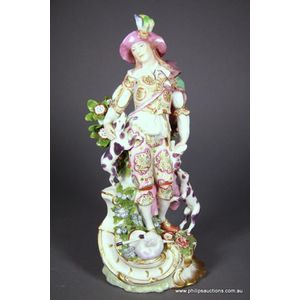Derby Soft Paste Neptune and Venus Figures, 1765
You must be a subscriber, and be logged in to view price and dealer details.
Subscribe Now to view actual auction price for this item
When you subscribe, you have the option of setting the currency in which to display prices to $Au, $US, $NZ or Stg.
- Soft Paste Porcelain - Porcelain is an ancient ceramic material, first made in China, hence the common name "china", and the process was unknown in the West.
European potters attempted to replicate Chinese porcelain, without knowing the ingredients in its composition, and the earliest wares were produced with mixtures of clay and ground-up glass (frit), the idea being that the glass would give the porcelain translucency.
It was given the name "soft" because it did not remain rigid, but "slumped" when fired in the kiln at high temperatures. - Circa - A Latin term meaning 'about', often used in the antique trade to give an approximate date for the piece, usually considered to be five years on either side of the circa year. Thus, circa 1900 means the piece was made about 1900, probably between 1895 and 1905. The expression is sometimes abbreviated to c.1900.
- Aphrodite / Venus - In Greek mythology, Aphrodite is the goddess of love, desire and beauty, whilst in Roman mythology she is called Venus.
- Putto / Putti / Amorino / Amorini - A putto (plural: putti) or amerino (plural: amerini) is a cherub or cupid frequently appearing in both mythological and religious paintings and sculpture, especially of the Renaissance and Baroque periods and later used as a decorative element in the design of furniture, ceramics, statuary etc. They are usually depicted as chubby males, or of indeterminate gender, often with wings. Their depiction may represent an association with love, heaven, peace or prosperity.
This item has been included into following indexes:
Visually similar items

A Derby pair of 'Ranelagh Dancers', circa 1760-70, a gallant and his companion, he in a tricorn hat, patterned orange hose with a striped doublet, a floral jacket and cape, she with a pink bodice and floral sprigged skirt, both holding posies, with bocage

A pair of Staffordshire figures, 'Elijah', and 'The Widow', early 19th century, Pearlware figures modelled in the round before bocages raised on grassy bases and square stands, Elijah feeding the ravens, and the despondent widow in a green dress and cape c

A Chelsea Imperial shepherd figure, circa 1780, the shepherd with small hounds in attendance beautifully attired in colours and abundant floral and decorative patterns, supported upon a rococo base with a large gold anchor mark to the reverse. Height 29.5

A soft paste figural candlestick attributed to Longton Hall, circa 1755 an animated classical figure in floral dress teasing a putto with a posy encrusted with flowers and raised on a moulded Rocaille base, sconce later and some professional repairs, heigh
